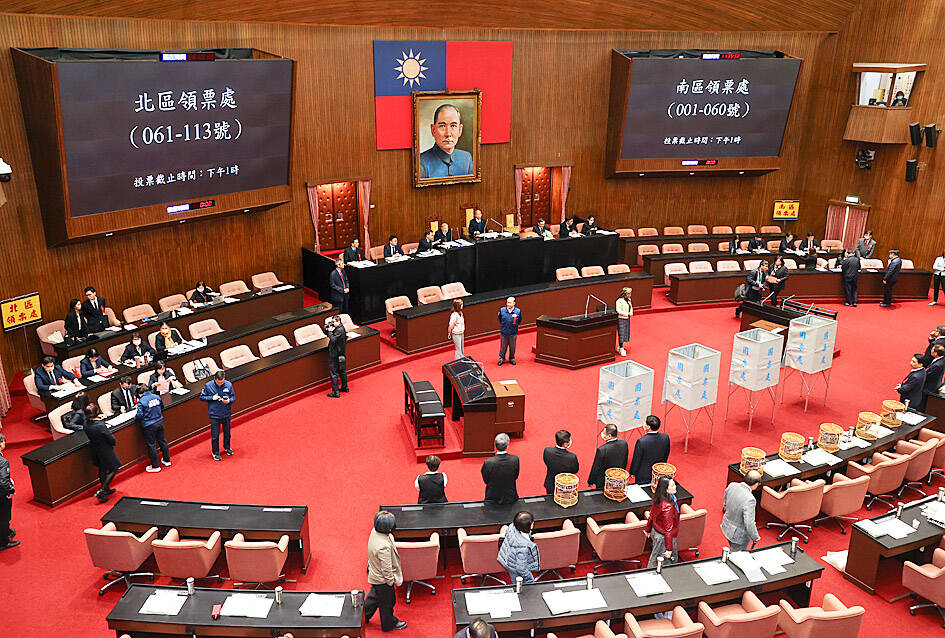Lawmakers yesterday upheld legislation that tightened requirements for petitions to initiate a recall of an elected official, effectively blocking the Executive Yuan’s attempt to overturn the measures.
In a meeting on the legislative floor, lawmakers from the opposition parties, who together hold a majority in the legislature, once again endorsed the amendments to the Civil Servants Election and Recall Act (公職人員選舉罷免法) passed in December last year.
The 60-51 vote in the 113-seat legislature broke along partisan lines, with two abstentions.

Photo: CNA
The revisions, which the Democratic Progressive Party (DPP) government has said would “exceedingly restrict” the public’s right to recall an elected official and “significantly increase the burden” of local electoral authorities, await the president’s signature to become law.
Chinese Nationalist Party (KMT) Legislator Wu Tsung-hsien (吳宗憲) said ahead of the revote, which was requested by the Executive Yuan, that the updated measures would ensure a “more rigorous and fairer” recall petition process.
KMT Legislator Weng Hsiao-ling (翁曉玲) said that, contrary to the government’s assertions, the tightened petition rules would facilitate the vetting of petition signatures by electoral authorities.
Yesterday’s result marked the third time that the Executive Yuan has failed to overturn legislation via a revote by lawmakers after deeming the rules to be “difficult to implement” despite having been approved by the current legislature.
The previous attempts involved legislation that raised the thresholds for Constitutional Court rulings and measures aimed at granting the legislature broader investigative powers.
The revote took place a day after President William Lai (賴清德) held talks with the heads of the five branches of government — the Executive Yuan, the Legislative Yuan, the Judicial Yuan, the Examination Yuan and the Control Yuan.
During the meeting, the heads of the government branches agreed to establish a communication platform, but it remains to be seen whether such a mechanism would be effective in resolving the disagreements between the ruling and opposition parties.
Recent tensions between the two sides have extended to judicial disputes and spilled over into the public sphere, with DPP members supporting initiatives to recall KMT lawmakers and the KMT launching similar efforts.
According to the Central Election Commission, campaigners have submitted initial recall petitions for 31 KMT lawmakers and 13 DPP lawmakers.
The amendments to the Civil Servants Election and Recall Act, adopted on Dec. 20 last year, were proposed by KMT lawmakers and backed by their counterparts from the Taiwan People’s Party.
The revisions would require individuals initiating a recall petition and those who sign up for them to provide photocopies of their ID cards when submitting their signatures.
The rules as they stand only require that ID numbers and registered addresses be submitted by signatories.

Alain Robert, known as the "French Spider-Man," praised Alex Honnold as exceptionally well-prepared after the US climber completed a free solo ascent of Taipei 101 yesterday. Robert said Honnold's ascent of the 508m-tall skyscraper in just more than one-and-a-half hours without using safety ropes or equipment was a remarkable achievement. "This is my life," he said in an interview conducted in French, adding that he liked the feeling of being "on the edge of danger." The 63-year-old Frenchman climbed Taipei 101 using ropes in December 2004, taking about four hours to reach the top. On a one-to-10 scale of difficulty, Robert said Taipei 101

Nipah virus infection is to be officially listed as a category 5 notifiable infectious disease in Taiwan in March, while clinical treatment guidelines are being formulated, the Centers for Disease Control (CDC) said yesterday. With Nipah infections being reported in other countries and considering its relatively high fatality rate, the centers on Jan. 16 announced that it would be listed as a notifiable infectious disease to bolster the nation’s systematic early warning system and increase public awareness, the CDC said. Bangladesh reported four fatal cases last year in separate districts, with three linked to raw date palm sap consumption, CDC Epidemic Intelligence

Two Taiwanese prosecutors were questioned by Chinese security personnel at their hotel during a trip to China’s Henan Province this month, the Mainland Affairs Council (MAC) said yesterday. The officers had personal information on the prosecutors, including “when they were assigned to their posts, their work locations and job titles,” MAC Deputy Minister and spokesman Liang Wen-chieh (梁文傑) said. On top of asking about their agencies and positions, the officers also questioned the prosecutors about the Cross-Strait Joint Crime-Fighting and Judicial Mutual Assistance Agreement, a pact that serves as the framework for Taiwan-China cooperation on combating crime and providing judicial assistance, Liang

US climber Alex Honnold left Taiwan this morning a day after completing a free-solo ascent of Taipei 101, a feat that drew cheers from onlookers and gained widespread international attention. Honnold yesterday scaled the 101-story skyscraper without a rope or safety harness. The climb — the highest urban free-solo ascent ever attempted — took just more than 90 minutes and was streamed live on Netflix. It was covered by major international news outlets including CNN, the New York Times, the Guardian and the Wall Street Journal. As Honnold prepared to leave Taiwan today, he attracted a crowd when he and his wife, Sanni,